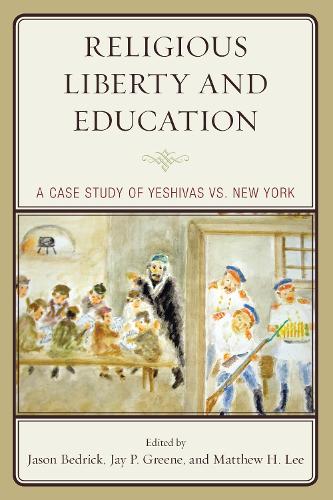
Religious Liberty and Education: A Case Study of Yeshivas vs. New York
(Paperback)
Publishing Details
Religious Liberty and Education: A Case Study of Yeshivas vs. New York
By (Author) Jason Bedrick
By (author) Jay P. Greene
By (author) Matthew H. Lee
Bloomsbury Publishing PLC
Rowman & Littlefield Publishers
1st September 2020
United States
Classifications
Professional and Scholarly
Non Fiction
Educational strategies and policy
Philosophy and theory of education
344.747077
Physical Properties
Paperback
184
Width 156mm, Height 230mm, Spine 14mm
286g
Description
Over the last few years, Orthodox Jewish private schools, also known as yeshivas, have been under fire by a group of activists known as Young Advocates for Fair Education, run by several yeshiva graduates, who have criticized them for providing an inadequate secular education.
At the heart of the yeshiva controversy lies two important interests in education: the right of the parent to choose an appropriate education, which may include values-laden religious education, and the right of each child to receive an appropriate education, as guaranteed by the state. These interests raise further questions. If preference is given to the former, how much freedom should be given to a parent in choosing an appropriate education If the latter, how does the state define what constitutes an appropriate education or measure the extent to which an appropriate education has been achieved And when canor mustthe state override the wishes of parents The purpose of this book is to explore these difficult questions.
Reviews
This important new book brilliantly illuminates the intersection between education and religious liberty, and shows just why what happens there is crucial for the future of our free society. -- Yuval Levin, editor of National Affairs
In this intriguing volume, Jason Bedrick, Jay Greene, and Matt Lee wrestle with the tensions that govern the relationship between faith and schooling. In an era when religious free exercise has become a lightning rod in areas ranging from health care to cake decoration, their careful exploration of whether and how the state should regulate religious schooling is both timely and clarifying. -- Frederick M. Hess, director of education policy studies at the American Enterprise Institute
This is an insightful, evenhanded treatment of these schools and their regulation that serves as a powerful counterweight to policy-makers unconsidered assumptions of normative education. The states paternalistic instinct is rarely tempered by a considered examination of law, ethics, morality, or religious freedom, something this book provides. The result is as important for our understanding of the ultimate aims of education and the states role in regulating it as it is for its commentary on this particular case alone. -- Moshe Krakowski, director, Azrieli Masters Program
Religious Liberty & Education makes a seemingly local and parochial case the occasion for a brilliant and indispensable study of public policy on education in America: The controversy over Haredi yeshivas has implications far beyond the borders of Borough Park or Crown Heights. -- Ruth Wisse, Professor Emerita, Harvard University
New York state education officials initial response to the Yeshiva controversy represents the worst of government overreach into private and religious education. The Catholic Church recognizes parents as the first educators of their children and thus they maintain the right to choose a school according to their conscience. Religious leaders fears of government intrusion into what and how we teach in our schools are no longer hypothetical. This wide-ranging compilation of papers represents diverse religious perspectives and utilizes experts from a wide range of professional backgrounds to reaffirm the importance of religious freedom for families and the religious institutions where they choose to educate their children. Parents, religious leaders and policy leaders, who value religious freedom, would be well-advised to read this book as a means of preparing for the many challenges to come. -- Jennifer Daniels, Associate Director for Public Policy, United States Conference of Catholic Bishops, Secretariat of Catholic Education
Author Bio
Jason M. Bedrick is director of policy for EdChoice and an adjunct scholar with the Cato Institute. He previously served as a legislator in the New Hampshire House of Representatives and was an education policy research fellow at the Josiah Bartlett Center for Public Policy.
Jay P. Greene is Distinguished Professor and Chair of the Department of Education Reform at the University of Arkansas. His current areas of research interest include school choice, culturally enriching field trips, and the effect of schools on non-cognitive and civic values.
Matthew H. Lee is Distinguished Doctoral Fellow and Senior Research Assistant in the Department of Education Reform at the University of Arkansas. Previously, he was a high school history teacher at a charter school in Massachusetts.
